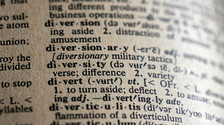azahrah.qolbaina
what the things that make verb 2 and verb 3 different
I was confised by verb 2 and verb 3. Can you explain it?
16 Mar 2012 11:16
Yanıtlar · 3
What is verb 1?
16 Mart 2012
It sounds like you're asking about patterns like "see - saw - seen", or (Brad's example) "go - went - gone".
Basically, the past participle ("verb 3") always needs a helping verb. Always. It can't function without one. So you can say "I have seen" or "it is gone", but "it gone" and "I seen" are completely wrong; you need "it went" and "I saw" (simple past) in these cases.
You use the past participle in perfect tenses (I have seen; I had eaten; I will have spoken), hypothetical forms using "have" (I should have known; it could have sunk), or passive forms (it is known; that was eaten).
Verb 2 (past simple) is the basic past tense of the verb.
16 Mart 2012
Are you talking about the simple past (e.g., "went") vs. the past participle (e.g., "gone")?
16 Mart 2012
Hâlâ cevap bulamadın mı?
Sorularını yaz ve ana dil konuşanlar sana yardım etsin!
azahrah.qolbaina
Dil Becerileri
Arapça, İngilizce, Endonezce, Türkçe
Öğrenim Dili
Arapça, İngilizce, Türkçe
Beğenebileceğin Makaleler

Top 6 Mistakes to Avoid with Vocabulary Acquisition
38 beğeni · 10 Yorumlar

Navigating Your First Job: Do's and Don'ts in the Workplace
47 beğeni · 21 Yorumlar

What Content to Watch to Acquire Advanced-level Proficiency
79 beğeni · 50 Yorumlar
Daha fazla makale
